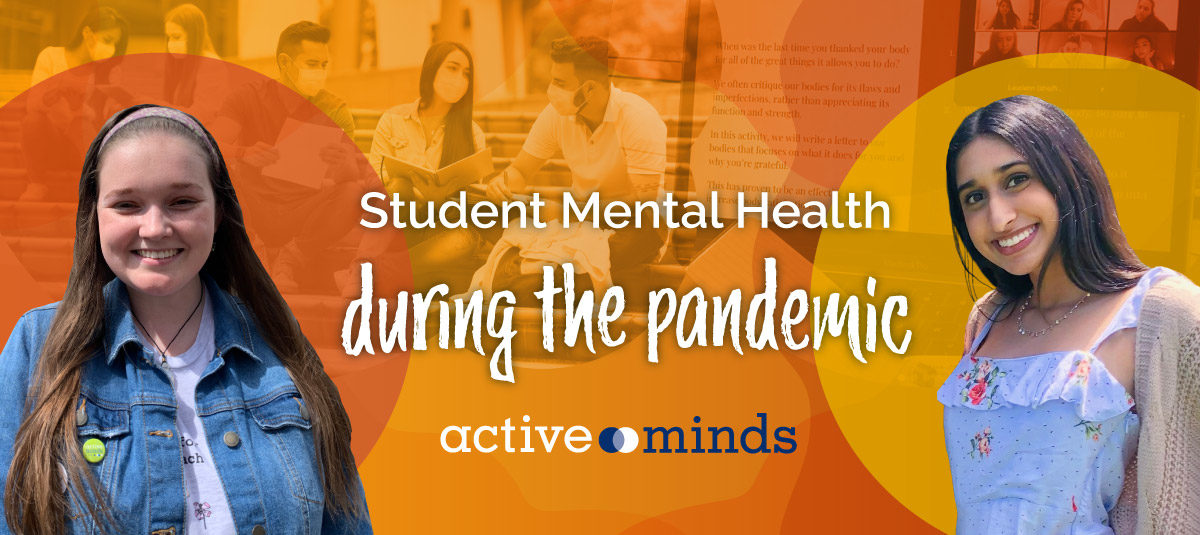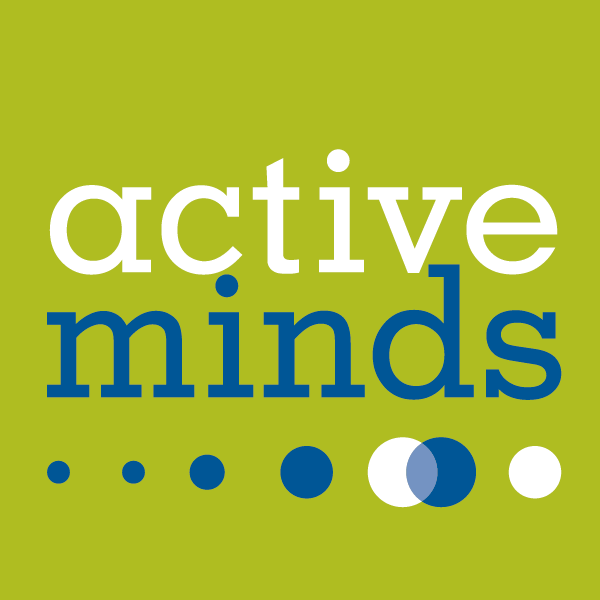As schools near the end of the fifth semester during the COVID-19 pandemic, we know that students are struggling while staff and administrators look for ways to best support their mental health. To learn more about what this support could look like, we’d like to share two perspectives from our Active Minds students. Kelly Maguire is a senior at Florida Gulf Coast University (FGCU), a member of the Active Minds Student Advisory Committee (SAC), and president of her school’s chapter. Natasha Reddy is a junior at the University of San Francisco (USF) and is also the president of her school’s chapter as well as a member of the SAC.
To start, throughout the pandemic, what policies has your school implemented in regards to COVID-19 safety?
Kelly: When I first transferred to FGCU in Fall 2020, my university required us to wear masks, keep socially distanced, and keep track of any coronavirus-related symptoms through an online, daily symptom tracker. If a student tested positive for COVID-19, they were required to either stay home for two weeks or live in the isolation building on campus. The majority of our classes were virtual, but we did have some hybrid and completely in-person classes. This continued up until Fall 2021, when some of our COVID-19 mandates, including the mask mandate, were lifted. Despite this, many faculty and staff still wore masks and practiced social distancing. Our campus also offered vaccine clinics and provided students with free COVID-19 testing kits before and after winter and summer break.
Natasha: When the pandemic started in March 2020, my university implemented fully remote learning and only began to transition to in-person learning last semester during the Fall of 2021, when the school began to provide both remote and in-person learning opportunities. This semester is the first fully in-person instructional modality since 2019. USF has implemented several COVID-19 policies to keep us safe. They mandated COVID-19 vaccinations and booster shots for students and faculty, face-coverings, a capacity limit in campus buildings, and providing a negative test before returning to school after extended periods, such as winter break. In addition, USF provides optional COVID-19 testing, a daily health check requirement to monitor symptoms and trace cases, and mandatory quarantine for any student that tests positive.
What are the current COVID-19 policies on your campus?
Kelly: Currently, FGCU has lifted all COVID-19 policies and mandates. Students, faculty, and staff are no longer required to wear masks, socially distance, or fill out our symptom tracker app.
Natasha: USF now holds most of the same policies that were implemented at the beginning of the pandemic. Face coverings and vaccinations are still required for all students and faculty, however, there are no capacity limits in campus buildings or physical distancing requirements.
How has your chapter adapted to changing policies?
Kelly: Our chapter has adapted to these changing policies by hosting meetings virtually, where students can still gather and have conversations related to mental health, including how the pandemic has impacted them. We also took advantage of participating in FGCU-outdoor events, such as our fall mental health fair. There, we were able to table and provide posters for students to take pictures with as long as we sanitized them in between each use. We also were able to table and hand out “one-touch” only items like Active Minds stickers, pins, and meeting flyers.
Natasha: My chapter was created during the pandemic, so we had only experienced virtual events. This semester, we have been transitioning to in-person events, with a mix of virtual and in-person events to accommodate students who are not yet comfortable with gathering in-person.
How has your school’s response to COVID-19 impacted your mental health, either positively or negatively?
Kelly: Despite so much change and uncertainty, my mental health has been impacted positively because I was still able to practice safety measures, while also having a more traditional college experience through activities like virtual meetings with my chapter, socially distanced events, and the return of in-person classes. Being able to participate in events, even if they were on a much smaller scale, socially distanced, and limited in activities, still provided us opportunities to stay connected. Negatively, my mental health was impacted by the lack of support and connection I’ve felt during the pandemic. Our counseling center also struggled to keep up with the demand for mental health services needed for students, and because of this, many of us, including myself, were unable to receive the adequate counseling that we needed during this time.
Natasha: My school’s response to COVID-19 has led me to experience a wide range of emotions. At the beginning of the pandemic when USF implemented remote learning, I thought learning and studying in my room for the rest of the semester might be nice for a change, as I wouldn’t have to spend time walking around from class to class. However, a few weeks of remote school turned into months, which gradually negatively impacted my mental health. Along with Zoom fatigue, I experienced a loss of connection with my school, peers, and professors. Once school returned to in-person instruction, it reignited hope and I felt a sense of relief as I could once again be united with the USF community. The COVID-19 policies in place such as mandating vaccinations/boosters and face masks have positively impacted my mental health as it has reduced my concerns and fears regarding contracting the virus. It has made me feel safer in my community knowing that USF is doing the best it can to ensure the spread of COVID-19 is minimal.
How can schools continue to support student mental health during a pandemic?
Kelly: Schools can continue to provide mental health support through more counseling opportunities. Something our university struggled with was prioritizing students over community members, as our counseling center is open to both. Because of this, students were turned away from individual counseling and instead could only receive group counseling, which filled up very early on in the semester. Providing resources like counseling and academic advising is essential during this time of uncertainty and adversity. If possible, schools should also provide more events for students to socialize and feel connected to one another. These can even be done virtually and still provide students with connection and engagement with their peers.
Natasha: Schools can continue to support student mental health during the pandemic by being flexible with attendance if we are feeling sick, offering counseling and therapy sessions, and coping tips and resources for students.
What advice do you have for students whose mental health has been negatively impacted by the pandemic?
Kelly: My biggest piece of advice is to take a step back and acknowledge and validate ourselves on how far we’ve come. It’s important to remember that while we may feel isolated and lonely at times, there are so many people out there who are there for us and understand the struggles we have faced. It is so important now, more than ever before, to be proud of ourselves and all the achievements we have made despite the times we are living in.
Natasha: You are not alone in being negatively impacted by the pandemic and your fellow peers are here to support you. However, it is important to seek help if you are struggling with your mental health.
There’s no simple solution to navigating a mental health crisis during a pandemic. However, what we’ve heard time and time again from our students is that they’re not looking for perfection, but rather accountability, flexibility, and understanding. They want to know that their campus is doing what it can to keep them safe, physically, mentally, and emotionally. This can look like offering mental health days, increasing counseling center capacity, and checking in on students who you suspect may be struggling. The pandemic has affected student mental health from Florida to California and everywhere in between, and it will continue to do so. For the faculty, staff, and administration looking for answers: show compassion for mental health. Whatever that may look like on your campus, make it a priority and students will benefit.




